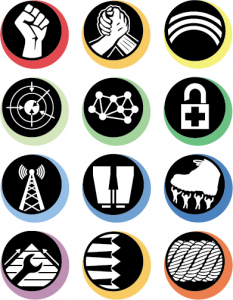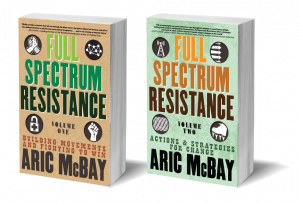We fight because we are fighting for survival. The planet is in the midst of an ecological apocalypse. We no longer need to talk about global ecological disasters in the future tense. Ecological collapse is underway, and climate change is our single most urgent global problem.
The critical danger is runaway global warming. The greenhouse effect is not linear, and there is not a one-to-one relationship between greenhouse gas emissions and climate change. People tend to think of warming like a thermostat on the wall; turn the greenhouse gases up a little bit, and the planet warms a little bit. But it’s more like throwing matches on to the living room sofa; sure, it gets a little warmer at first, but if you don’t put out the fire the whole house will go up in flames.
There are planetary tipping points that make global warming accelerate dramatically. As Arctic ice melts, reflective white snow is replaced with dark water that absorbs more sunlight. And Arctic warming is already melting methane on the ocean floor, releasing huge plumes of greenhouse gases that had been safely contained for eons.
International climate accords like those written at Kyoto, Copenhagen, and Paris are woefully inadequate. They would be laughable if the consequences weren’t so dire. Not only are they insufficient, they aren’t even being followed. We’re already well into the worst-case scenario of global warming projections from only a few years ago. The UN Intergovernmental Panel on Climate Change (IPCC) has warned that decisive and drastic action must be taken by 2030 in order to avoid catastrophic climate change. But even that stark warning has been called “incredibly conservative” by groups like the Grantham Research Institute on Climate Change, which point out that the IPCC doesn’t take into account runaway climate change tipping points.22 We must all understand that this scenario—or any massive climate change—would roll back all of the social justice gains we’ve managed over the last few centuries.
Global warming is a great emergency, but ecological injury is ubiquitous—virtually every biome and ecological indicator is in decline. Ninety percent of big fish have been wiped out in fifty years, with more recent research suggesting it is now past 95 percent. In the middle of the Pacific Ocean there is fifteen times as much plastic as phytoplankton. Soil is being lost twenty times as fast as it can be replenished. Many areas in North America have lost 98 percent of their original topsoil. More than half of tropical forests have been wiped out. The Amazon rainforest, in particular, has its own tipping points. Because the rainforests are so large as to create their own climates, their continued destruction could cause a permanent drought which would spread into the northern hemisphere and “massively accelerate global warming with incalculable consequences . . . a process that might end in the world becoming uninhabitable.”23
There is a dangerous idea in some circles that to care about the planet is a privilege of the middle class, and that the environment is a secondary consideration to basic human rights. But in reality, the two can’t be separated. The human burden of ecocide is carried by the poorest, by Indigenous people, by refugees displaced by climate-induced wars, and especially by women. There will be no human rights—let alone human life—without a habitable biosphere. If we don’t stop this destruction we will die, but not before human justice does.


